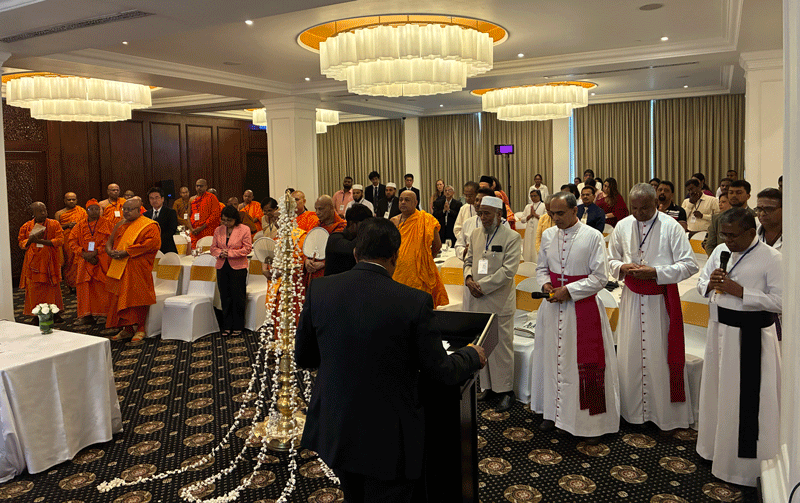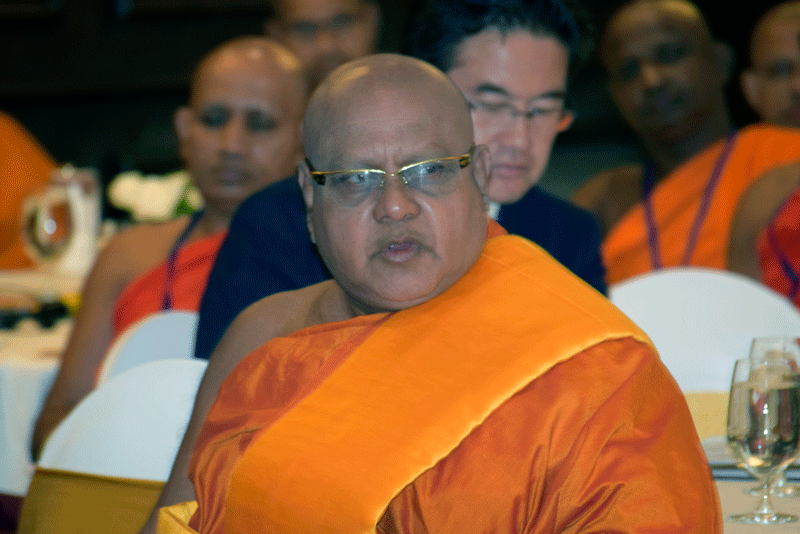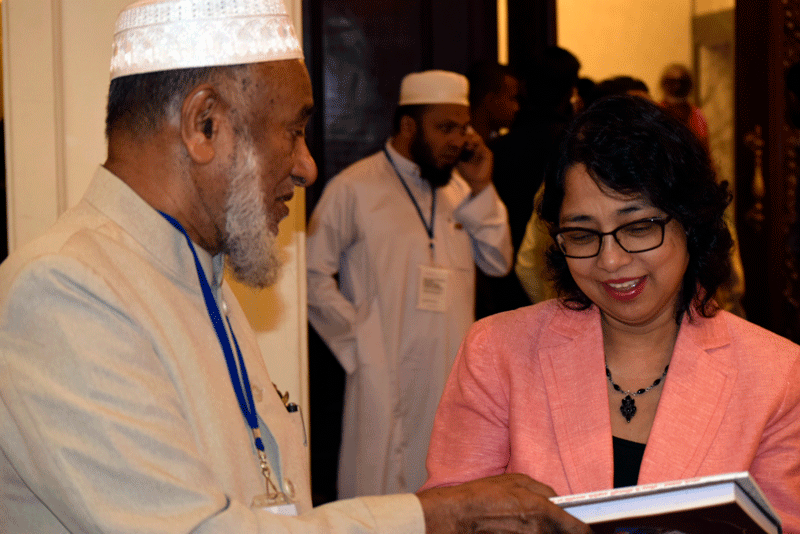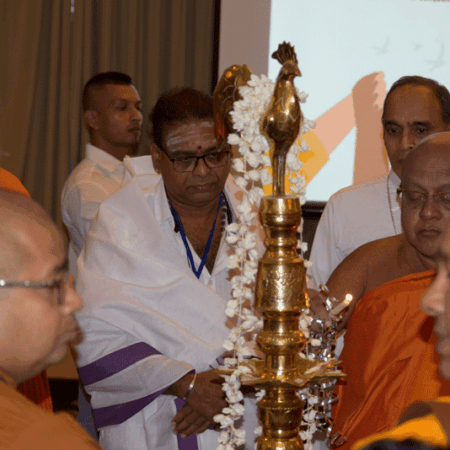Sri Lanka’s Religious Leaders Vow Deeper Interreligious Cooperation for the Common Good
November 14, 2025
High-level religious leaders in Sri Lanka committed to engaging in greater inter-religious dialogue and cooperation at a forum organized by the Sri Lanka Council of Religions for Peace in early November.
The event featured leaders of each of the country’s four major religions. Religions for Peace International and Religions for Peace Asia – represented by Deputy Secretary General Deepika Singh and Secretary General Rev. Dr. Yoshinori Shinohara, respectively – also participated.

“Religious harmony is not about making all religions one – it is about recognizing the sacred in each other’s faiths,” said Most Venerable Dr. Kotapitiye Rahula Thera, president of the Sri Lanka Council of Religions for Peace in opening the event Nov. 3 in Colombo. “When we listen to understand, not just to reply, we create a space where peace can grow. In that space, anyone can sit beside a Buddhist, a Christian, a Muslim, a Hindu, or any other religious follower – not in conflict but in friendship.”
Read the statement of commitment from the religious leaders
More than 100 religious leaders from across Sri Lanka participated in the high-level forum. Leaders of the country’s predominant faith, Buddhism, joined Hindu, Muslim and Christian leaders at the day-long event. Hon. Muneer Mulaffer, Deputy Minister of Religious and Cultural Affairs, and a representative of Hon. Sajith Premadasa, the Opposition Leader of the Democratic Socialist Republic of Sri Lanka, also participated.
“We gather here, united by a common desire-to build a more peaceful, just and flourishing world for all,” Hon. Sajith Premadasa’s representative said. “Reconciliation is not just an ideal but a moral and civic duty…. True inter-religious harmony must be rooted in (the) shared spiritual values (of Sri Lanka’s religions), transcending mere tolerance to foster genuine connection and peace among communities.”
The event featured two thematic panel discussions, including presentations by esteemed religious leaders and audience questions and answers.
Rev. Dr. Wadinagala Pannaloka, Secretary General, Sri Lanka Council of Religions for Peace and Senior Lecturer at the University of Buddhist and Pali Studies opened the first panel discussion, “Issues and Challenges for Multi-Religious and Multi-Stakeholder Engagement for the Common Good in Sri Lanka.”
Religious traditions can work together, he said, in building a better society “where each and every citizen is respected and protected” – and further to address the challenges and the difficulties to peace and reconciliation efforts, he said. He pointed to the successful resolution of a conflict regarding halal practices as proof of the power of inter-religious cooperation and collaboration.
“In that incident, the Sri Lanka Council of Religions for Peace engaged actively and asked all the involving parties to come to one table, and under the guidance of venerable Professor, late venerable Professor Mellan Vimal Rathana, there had been a successful discussion which led finally to settling the issue without any violence.”

H.L. Dr. Bishop Valence Mendis, Vice President, Sri Lanka Council of Religions for Peace and Bishop of Kandy, framed the panel’s discussions with a comprehensive presentation on the primary elements of what constitutes the “common good.”
Despite the “diversity, of religions, ethnicities, and many other divisions and differences,” all humans “share the common characteristic of seeking for further improvement through our religious traditions,” Bishop Mendis said. This, he explained, establishes the foundational unity necessary for dialogue; success, he said, is based on achieving “common good,” not “individualistic success.”
He emphasized the belief that individual successes can be a “false understanding” if they do not contribute to the whole society. He presented a detailed breakdown of what “Common Good in Sri Lanka” means, explaining that the common good goes far beyond basic peace.
He highlighted ten facets of common good in Sri Lanka serving as a comprehensive national vision that religious leaders must protect. These included protecting the nation’s sovereignty, its economic development to alleviate poverty, and its culture. Further, he said, protecting the common good should entail maintaining the nation’s strong religious cultural traditions.
“What is Sri Lanka without the religions?” he said. “What is Sri Lanka without Buddhism – 70% of the population? What is Sri Lanka without the Muslim population? What is Sri Lanka without the Hindu population? And what is Sri Lanka without the Christian population? Religion is part and part of the ethos of our country.”

In response to Bishop Mendis’s presentation, Ms. Sumadhu Weerawarne, a specialist in Peacebuilding, Governance and Communication, introduced concrete data from the Pew Research Center, providing a factual basis for Sri Lanka’s pluralistic foundation. That research – showing that the vast majority of Sri Lankans accept the diversity of religions and even greater numbers reject violence – “is a highly positive foundation for peace work,” she said.
Religious leaders, unlike politicians, are “permanent leaders,” she said, who provide a steady moral compass, while politicians “come and go” and “change over time.” This elevates the role of the Sri Lanka Council of Religions for Peace as essential moral guides, especially for dealing with conflicts and points of tension, which is the “much harder” work than celebrating cohesion, she concluded.
The second panel discussion, which examined the Role of Multi-Religious Collaboration to Advance Peace and Reconciliation in Sri Lanka, was moderated by Dr. Swami Gunatithananda, Vice President, Sri Lanka Council of Religions for Peace and Resident Swami, Chinmaya Mission of Sri Lanka.
The panel featured powerful calls from a diversity of religious leaders for practical interreligious collaboration. Among these were calls to establish permanent inter-religious councils at the national and local levels and to develop an early warning mechanism to facilitate rapid response to conflict. A youth leader, Mr. Janithu Hettiaracchi, emphasized that developing the potential of young people in building peace requires that their energies are channelled or guided through activities and projects.
“People from different backgrounds, from different religious backgrounds, when they join together for a common cause, then you understand each other,” he said. All the theory of peacebuilding, he said, must be translated into practice.